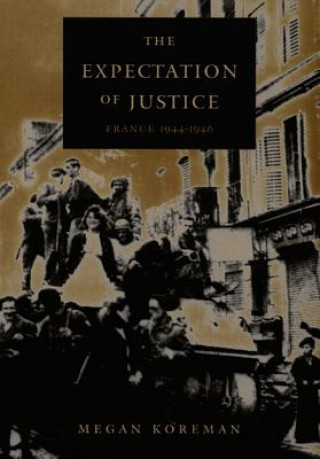
Code: 04937133
Expectation of Justice
by Megan Koreman
In "The Expectation of Justice" Megan Koreman traces the experiences of three small French towns during the troubled months of the Provisional Government following the Liberation in 1944. Her descriptions of the towns' different w ... more
- Language:
 English
English - Binding: Paperback
- Number of pages: 368
Publisher: Duke University Press, 2000
- More about this

You might also like
-

Speaking Greek 2 Audio CD set
36.56 € -

Moral Essays
31.53 € -10 % -

Dictionary of Literary Biography
608.16 € -

Borrowed Children
18.23 € -

Cern: How We Found The Higgs Boson
65.68 € -

Financial Modernization and Regulation
119.79 € -

Costume and Make-up
16.01 € -4 %
Give this book as a present today
- Order book and choose Gift Order.
- We will send you book gift voucher at once. You can give it out to anyone.
- Book will be send to donee, nothing more to care about.
More about Expectation of Justice
You get 91 loyalty points
 Book synopsis
Book synopsis
In "The Expectation of Justice" Megan Koreman traces the experiences of three small French towns during the troubled months of the Provisional Government following the Liberation in 1944. Her descriptions of the towns' different wartime and postwar experiences contribute to a fresh depiction of mid-century France and illustrate the failure of the postwar government to adequately serve the interests of justice. As the first social history of the "apres -Liberation" period from the perspective of ordinary people, Koreman's study reveals how citizens of these towns expected legal, social, and honorary justice - such as punishment for collaborators, fair food distribution, and formal commemoration of patriots, both living and dead. Although the French expected the Resistance's Provisional Government to act according to local understandings of justice, its policies often violated local sensibilities by instead pursuing national considerations. Koreman assesses both the citizens' eventual disillusionment and the social costs of the "Resistencialist myth" propagated by the de Gaulle government in an effort to hold together the fragmented postwar nation. She also suggests that the local demands for justice created by World War II were stifled by the Cold War, since many people in France feared that open opposition to the government would lead to a Communist takeover. This pattern of nationally instituted denial and suppression made it difficult for citizens to deal effectively with memories of wartime suffering and collaborationist betrayal. Now, with the end of the Cold War, says Koreman, memories of postwar injustices are resurfacing, and there is renewed interest in witnessing just and deserved closure.
 Book details
Book details
Book category Books in English Humanities History Regional & national history
36.26 €
- Full title: Expectation of Justice
- Subtitle: France, 1944-1946
- Author: Megan Koreman
- Language:
 English
English - Binding: Paperback
- Number of pages: 368
- EAN: 9780822323730
- ISBN: 0822323737
- ID: 04937133
- Publisher: Duke University Press
- Weight: 636 g
- Dimensions: 231 × 158 × 28 mm
- Date of publishing: 26. January 2000
Trending among others
-

Strange Death of Europe
15.20 € -22 % -

Secret History
11.27 € -28 % -

History of the Ancient Near East ca. 3000 - 323 BC 3e
55.51 € -

City of Fortune
14.30 € -22 % -

Short History of England
11.38 € -27 % -

The Great Depression: A Diary
17.92 € -14 % -

Gulag
15.30 € -27 % -

Native American History
20.75 € -13 % -

Hangman's Diary
12.08 € -25 % -

To Hell and Back
16.61 € -22 % -

Complete Pompeii
30.82 € -23 % -

Olympic, Titanic, Britannic
28.10 € -19 % -

With the Old Breed
15.71 € -25 % -

Constantinople
15.10 € -18 % -

Life and Death of Anne Boleyn
22.86 € -4 % -

Few
10.57 € -18 % -

World of Saint Patrick
33.04 € -7 % -

Venetians in Constantinople
36.36 € -

Ninja, The Secret History of Ninjutsu
15.10 € -16 % -

Kojiki
29.81 € -4 % -

Century of Palestinian Rejectionism and Jew Hatred
9.36 € -16 % -

Kaiser Wilhelm II
27.19 € -11 % -

Australia: A Very Short Introduction
9.26 € -28 % -

Russia and the Russians
19.34 € -27 % -

Civilization of Europe in the Renaissance
17.32 € -13 % -

Russia Under the Old Regime
13.29 € -28 % -

Iran-Iraq War
51.48 € -10 % -

US HISTORY
11.88 € -1 % -

How to Write an IB History Essay
21.55 € -

French Army 1870-71 Franco-Prussian War (2)
16.61 € -10 % -

Decline and Fall of the Roman Empire: Vols 1-3
60.04 € -28 % -

1812
20.14 € -28 % -

German Order of Battle
22.56 € -

Midnight at the Pera Palace
16.61 € -17 % -

Amazons
12.79 € -18 % -

Empire of the Steppes
65.08 € -

The Fourth Turning
20.54 € -6 % -

Beyond Band of Brothers
15.20 € -28 % -

Genghis Khan
19.44 € -7 % -

Ten Myths About Israel
13.49 € -35 % -

Ethnic Cleansing of Palestine
12.89 € -25 % -

How to be a Victorian
13.29 € -28 % -

Easy Company Soldier
15.61 € -25 % -

Cuneiform
10.27 € -28 % -

Twelve Caesars
11.27 € -28 % -

Russia under Tsarism and Communism 1881-1953 Second Edition
47.75 € -

Plantagenets
15.10 € -18 % -

Hundred Years' War on Palestine
11.98 € -24 % -

Diana: Her True Story - In Her Own Words
10.97 € -25 %
Collection points Bratislava a 2642 dalších
Copyright ©2008-24 najlacnejsie-knihy.sk All rights reservedPrivacyCookies



 15549 collection points
15549 collection points Delivery 2.99 €
Delivery 2.99 € 02/210 210 99 (8-15.30h)
02/210 210 99 (8-15.30h)